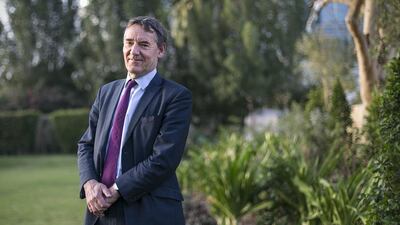In 1982, Jim O’Neill, the Goldman Sachs economist who became a British Treasury minister, completed a doctoral thesis arguing that Opec oil producers did not put their savings to good use. Gulf sovereigns paid scant attention to rates of return, he wrote – and worse, made investment decisions on an “ad hoc basis”.
But now, 23 years later, Lord O’Neill is visiting the UAE to ask its sovereign wealth funds to invest their savings into Britain’s post-industrial northern cities, as part of an infrastructure initiative the UK government calls the “Northern Powerhouse”.
“I’m trying to help the government deliver on … its infrastructure objectives,” Lord O’Neill said.
That involves convincing funds to start “thinking about real estate and other infrastructure investments [outside of] London”.
“I will be handing over a pitchbook with ideas about the Midlands because a major priority of ours is to … promote the development more of urban growth outside of London,” he said.
Abu Dhabi has long been a major investor in the United Kingdom. The Abu Dhabi Investment Authority (Adia), for example, holds a significant property portfolio in London as well as stakes in hotels and UK utilities. But Lord O’Neill wants the UAE’s funds to look beyond the British capital and instead look at Manchester, Sheffield and Leeds, northern cities in which joblessness has risen as deindustrialisation takes root.
Despite spending 15 years at Goldman, Lord O’Neill retains his Mancunian accent. He mentions Abu Dhabi United Group’s investments in the city of his birth, including the development of a football academy, an expansion to the Manchester City stadium and new aviation infrastructure around Manchester Airport.
“It’s a very poor part of Manchester historically and to witness that changing as a Mancunian and as someone at the core of the Northern Powerhouse is a fantastic thing to observe,” he said.
Lord O’Neill hopes that “the appetite for private investment” in similar projects has grown in recent years.
Courting sovereign wealth for domestic UK infrastructure investments has been a theme of recent official visits to the UAE. Dominic Jeremey, a former UK ambassador to the UAE and the current ambassador to Afghanistan, visited in June last year.
Lord O’Neill also weighed in on the UK’s Brexit debate, arguing that voting to leave the 27-member bloc makes little economic sense. “The EU is the UK’s biggest trade partner by a considerable distance.
“We have been a long established and important member of it. A world in which we were not part of the EU would be a very problematic world for the UK,” he said.
At Goldman, Lord O’Neill coined the acronym Bric – shorthand for the economies of Brazil, Russia, India and China. “As ‘Lord Bric’, I’m very aware of changing global trade patterns,” he said. “But that doesn’t translate into a case for saying that the UK should leave EU.
“The degree of destabilisation that would immediately follow [Brexit] might be enjoyable for some of my old friends in the hedge fund world but in terms of lasting economic benefits I can’t think of any obvious ones,” he said.
“It’s not obvious to me that it’s a very smart thing to do.”
abouyamourn@thenational.ae
Follow The National's Business section on Twitter

